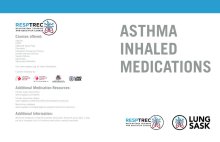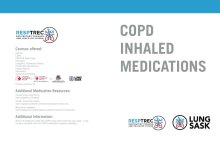Medication Resources
For information on generic and brand name drugs available in Canada, including:
- How do particular drugs work in my body?
- Are there any unwanted or side effects?
- What precautions should I take?
- How do I take the medication?
- Prescription Drug Coverage in Canada. Your guide to reimbursement for prescription medications in Canada.
- Each inhaled medication uses a different device. Using your device properly helps you get the right dose of medication. Watch these videos to ensure you are using yours correctly.
- Prescription drugs are approved by various governmental agencies federally and provincially. Access to Prescription Drugs in Canada provides an overview of how prescription drugs are approved and made available in Canada.
A•AA-Ipravent inhalation solution •AA-Theo LA tablets •Abevmy® injection •Abrysvo® vaccine •Acarizax™ tablet •ACH-Montelukast tablets •ACT Ciprofloxacin tablets •Adcirca® tablets •Adempas® tablets •Advair Diskus inhaler •Advair inhaler •Aermony Respiclick™ inhaler •Afluria® Tetra vaccine •Alecensaro® capsule •Alimta® injection •Alunbrig® tablets •Alvesco® inhaler •Alyftrek™ tablets •Amikacin Sulfate Injection •Amoxicillin capsules •Amoxicillin Sugar Reduced suspension •Amoxicillin suspension •Amoxicillin/Clav tablets •Anoro Ellipta inhaler •Apo-Ambrisentan tablets •Apo-Amoxi capsules •Apo-Amoxi Clav tablets •Apo-Amoxi suspension •Apo-Azelastine/Fluticasone nasal spray •Apo-Azithromycin Z tablets •Apo-Beclomethasone nasal spray •Apo-Cefadroxil capsules •Apo-Cefuroxime tablets •Apo-Cephalex tablets •Apo-Clarithromycin tablets •Apo-Clarithromycin XL tablets •Apo-Dexamethasone tablets •Apo-Doxy capsules •Apo-Doxy tablets •Apo-Erlotinib tablets •Apo-Fluconazole tablets •Apo-Fluticasone HFA inhaler •Apo-Fluticasone nasal spray •Apo-Gefitinib tablets •Apo-Ketoconazole tablets •Apo-Levofloxacin tablets •Apo-Linezolid tablets •Apo-Mometasone nasal spray •Apo-Montelukast chewable tablets •Apo-Montelukast tablets •Apo-Moxifloxacin tablets •Apo-Prednisone tablets •Apo-Salbutamol HFA inhaler •Apo-Tadalafil PAH tablets •Apo-Triamcinolone AQ nasal spray •Apo-Varenicline tablets •Arexvy vaccine •Arnuity Ellipta inhaler •Asmanex® Twisthaler® inhaler •Atectura® Breezhaler® inhaler •Atrovent® HFA inhaler •Auro-Amoxicillin capsules •Auro-Amoxicillin suspension •Auro-Amoxiclav tablets •Auro-Azithromycin suspension •Auro-Cefixime suspension •Auro-Cefixime tablets •Auro-Cefprozil suspension •Auro-Cefprozil tablets •Auro-Cefuroxime tablets •Auro-Cephalexin suspension •Auro-Cephalexin tablets •Auro-Ciprofloxacin tablets •Auro-Clindamycin capsules •Auro-Montelukast chewable tablets •Auro-Montelukast tablets •Auro-Moxifloxacin tablets •Auro-Pirfenidone tablets •Avamys nasal spray •Avastin® injection •Aybintio® injection •Azithromycin tablets B•Bambevi® injection •Beyfortus® injection •Biaxin BID® tablets •Biaxin® suspension •Breo Ellipta inhaler •Breztri™ Aerosphere® inhaler •Bricanyl® Turbuhaler® inhaler C•Capvaxive® vaccine •Carboplatin Injection •Caripul® injection •Cayston® inhalation solution •Cefazolin Injection •Cefotaxime injection •Ceftin® suspension •Cephalexin tablets •Cinqair™ injection •Ciprofloxacin tablets •Cipro® suspension •Cisplatin injection •Clarithromycin tablets •Clavulin® suspension •Clindamycin capsules •Colistimethate •Coly-mycin M •Combivent® Respimat® inhaler •Comirnaty® vaccine •Cravv® D•Dalacin® C suspension •Daxas® tablets •Diflucan® suspension •Doxycycline tablets •Doxycycline capsules •Duaklir® Genuair® inhaler •Dupixent® injection •Dymista® nasal spray E•Elixir de Theophylline •Enerzair® Breezhaler® inhaler •Etibi® tablets F•Fasenra® injection •Flolan injection •Flonase Allergy Relief nasal spray •Flovent Diskus inhaler •Flovent HFA inhaler •Fluad® Pediatric vaccine •Fluad® vaccine •Flucelvax® vaccine •Fluconazole tablets •FluMist® vaccine •Fluviral vaccine •Fluzone High-Dose® vaccine •Fluzone® vaccine G•Giotrif® tablets •Glassia® injection •Grastek® tablets H•Habitrol® patches I•Imdelltra™ injection •Imfinzi® injection •Incruse Ellipta inhaler •Influvac® vaccine •Inspiolto® Respimat® inhaler •Ipratropium Bromide and Salbutamol Sulphate inhalation solution •Ipravent nasal spray •Iressa® tablets •Itulatek® tablets J•Jamp Amoxi Clav suspension •Jamp Amoxi Clav tablet •Jamp Cefuroxime tablets •Jamp Cephalexin suspension •Jamp Cephalexin tablets •Jamp Clindamycin capsules •Jamp Cloxacillin capsules •Jamp Doxycycline capsules •Jamp Gefitinib tablet •Jamp Ipratropium HFA inhaler •Jamp Itraconazole Oral Solution •Jamp Levofloxacin tablets •Jamp Linezolid tablets •Jamp Montelukast chewable tablets •Jamp Oseltamivir capsules •Jamp Pirfenidone capsules •Jamp Pirfenidone tablets •Jamp-Amoxicillin capsules •Jamp-Amoxicillin suspension •Jamp-Azithromycin tablets •Jamp-Cefadroxil capsules •Jamp-Ciprofloxacin tablets •Jamp-Montelukast tablets •Jamp-Moxifloxacin tablets •Jamp-Nystatin Oral Suspension •Jamp-Sildenafil R tablets K•Kalydeco® granules •Kalydeco® tablets •Keytruda® injection L•Libtayo® injection •Lorbrena™ tablets •Lupin-Cephalexin suspension •Lupin-Cephalexin tablets •Lupin-Tiotropium inhaler M•M-Amoxi Clav suspension •M-Azithromcyin tablets •M-Clarithromycin tablets •M-Clindamycin capsules •M-Montelukast chewable tablets •M-Montelukast tablets •M-Moxifloxacin tablet •M-Pirfenidone tablets •Mar-Azithromycin tablets •Mar-Ciprofloxacin tablets •Mar-Montelukast chewable tablets •Mar-Montelukast tablets •Minocycline capsules •Mint-Ciproflox tablets •Mint-Itraconazole capsules •Mint-Montelukast chewable tablets •Mint-Montelukast tablets •Mint-Oseltamivir capsules •Mint-Varenicline tablets •Mometasone nasal spray •Montelukast tablets •Moxifloxacin tablets •Mvasi® injection •Mycobutin capsules •Mylan-Azelastine/Fluticasone nasal spray •Mylan-Beclo AQ nasal spray •Mylan-Budesonide AQ nasal spray •Mylan-Fluconazole tablets N•Nasacort® AQ nasal spray •Nasonex® nasal spray •Nat-Bosentan tablets •Nat-Erlotinib tablet •NAT-Gefitinib tablets •Nat-Montelukast chewable tablets •Nat-Montelukast tablets •Nat-Oseltamivir capsules •Nat-Oseltamivir suspension •Nic-Hit gum •Nic-Hit mini lozenge •Nic-Hit spray •Nicoderm® patches •Nicorette® gum •Nicorette® inhaler •Nicorette® lozenges •Nicorette® QuickMist® spray •Nicotine gum •Nicotine patch •NRA-Varenicline tablets •Nucala™ injection O•Odan Itraconazole solution •Odan-Dexamethasone elixir •Ofev® capsules •Omlyclo® injection •Omnaris® nasal spray •Opdivo® injection •Opsumit® tablets •Opsynvi® tablets •Oralair® tablets •Orkambi® granules •Orkambi® tablets •Oxeze® Turbuhaler® inhaler P•Paclitaxel Injection •Paxlovid™ tablets •pdp-Isoniazid solution •pdp-Isoniazid tablets •pdp-Pyrazinamide tablets •Pen-VK tablets •pms-Azithromycin tablets •pms-Bosentan tablets •pms-Ciprofloxacin tablets •pms-Dexamethasone Elixir •pms-Dexamethasone tablets •pms-Erlotinib tablets •pms-Fluconazole tablets •pms-Fluticasone HFA inhaler •pms-Fluticasone Propionate/ Salmeterol DPI inhaler •pms-Ipratropium inhalation solution •pms-Ipratropium nasal spray •pms-Montelukast chewable tablets •pms-Montelukast FC tablets •pms-Nystatin suspension •pms-Pirfenidone tablets •pms-Salbutamol inhalation solution •pms-Sildenafil R tablets •Prevnar 20™ •Prolastin®-C •PRZ-Amoxicillin capsules •PRZ-Doxycycline tablets •Pulmicort® Nebuamp® inhalation suspension •Pulmicort® Turbuhaler® inhaler •Pulmozyme® inhalation solution Q•Quinsair® inhalation solution •QVAR® inhaler R•Ragwitek® tablets •Relenza inhaler •Retevmo™ capsules •Revatio® tablets •Rhinocort® Aqua nasal spray •Riva-Azithromycin tablets •Rofact® capsules •Rozlytrek® capsules •Ryaltris® nasal spray S•Salbutamol HFA inhaler •Sandoz Ambrisentan tablets •Sandoz Amoxicillin suspension •Sandoz Azithromycin tablets •Sandoz Azithromycin suspension •Sandoz Ciprofloxacin tablets •Sandoz Clarithromycin tablets •Sandoz Levofloxacin tablets •Sandoz Linezolid tablets •Sandoz Mometasone nasal spray •Sandoz Montelukast chewable tablets •Sandoz Montelukast tablets •Sandoz Moxifloxacin tablets •Sandoz Oseltamivir capsules •Sandoz Pirfenidone capsules •Sandoz Pirfenidone tablets •Sandoz® Amoxi-Clav tablets •Sandoz® Gefitinib tablets •Sandoz® Riociguat tablets •Seebri® Breezhaler® inhaler •Serevent Diskus inhaler •Singulair® chewable tablets •Singulair® oral granules •Singulair® oral tablets •SPC-Cefprozil suspension •SPC-Cefprozil tablets •SPC-Montelukast tablets •Spikevax® vaccine •Spiriva® inhaler •Spiriva® Respimat® inhaler •Sporanox® capsules •Sulfatrim DS tablets •Sulfatrim Pediatric tablets •Sulfatrim tablets •Suprax® suspension •Suprax® tablets •Symbicort® Turbuhaler® inhaler •Symdeko™ tablets •Synagis® injection T•Tagrisso® tablets •Tamiflu® capsules •Tamiflu® suspension •Taro-Bosentan tablets •Taro-Budesonide inhalation solution •Taro-Ciproflox tablets •Taro-Clarithromycin suspension •Taro-Clarithromycin tablets •Taro-Pemetrexed injection •Tecentriq® injection •Teva-Amoxicillin capsules •Teva-Amoxicillin chewable tablets •Teva-Amoxicillin Sugar-Reduced suspension •Teva-Amoxicillin suspension •Teva-Ampicillin capsules •Teva-Budesonide inhalation suspension •Teva-Cefadroxil capsules •Teva-Cephalexin capsules •Teva-Cephalexin suspension •Teva-Cephalexin tablets •Teva-Clarithromycin XL tablets •Teva-Clindamycin capsules •Teva-Cloxacillin capsules •Teva-Cloxacillin solution •Teva-Combo Sterinebs® •Teva-Doxycycline capsules •Teva-Doxycycline tablets •Teva-Erlotinib tablets •Teva-Etoposide injection •Teva-Fluticasone nasal spray •Teva-Ipratropium Sterineb® inhalation solution •Teva-Ketoconazole tablets •Teva-Levofloxacin tablets •Teva-Mometasone nasal spray •Teva-Montelukast chewable tablets •Teva-Montelukast tablets •Teva-Moxifloxacin tablets •Teva-Nystatin suspension •Teva-Prednisone tablets •Teva-Salbutamol HFA inhaler •Teva-Salbutamol Sterinebs™ P.F. inhalation solution •Teva-Sildenafil R tablets •Teva-Tobramycin inhalation solution •Teva-Topotecan injection •Tezspire™ •Theo ER tablets •Thrive® gum •Thrive® lozenges •Tobi® inhalation solution •Tobi® Podhaler® inhaler •Topotecan Hydrochloride injection •Tracleer® tablets •Trelegy Ellipta •Trikafta® granules •Trikafta® tablets •Tudorza® Genuair® inhaler U•Ultibro® Breezhaler® inhaler •Uptravi® tablets V•Vaxneuvance® vaccine •Vegzelma™ injection •Veklury® injection •Ventolin Diskus inhaler •Ventolin HFA inhaler •Vepesid® capsules •Vinorelbine injection •Volibris tablets W•Winpred® tablets •Wixela® Inhub® inhaler X•Xalkori® capsules •Xolair® injection Y•Yervoy® injection Z•Zaditen® tablets •Zenhale® inhaler •Zirabev® injection •Zyban® tablets •Zykadia® capsules •Zyvoxam® suspension
a•allergic rhinitis •allergies •asthma b•bronchitis •bronchospasm associated with COPD c•candidiasis •chronic bronchitis (COPD) •congenital alpha1-antitrypsin deficiency •COPD •COVID-19 •cystic fibrosis d•depression e•emphysema (COPD) •exercise-induced bronchospasm f•flu h•hay fever i•influenza m•middle ear infections n•nasal polyps •nicotine addiction •nicotine withdrawal symptoms •non-small cell lung cancer p•perennial rhinitis •pharyngitis •pneumonia •primary pulmonary hypertension •pulmonary fibrosis •Respiratory Syncytial Virus (RSV) r•respiratory tract infections •rhinitis •runny nose s•seasonal allergies •seasonal rhinitis •secondary pulmonary hypertension •sinus infections •sinusitis •sleep apnea •small cell lung cancer •sore throat t•thrush •tonsilitis •tuberculosis u•upper respiratory tract infections y•year-round allergies •yeast infection of the mouth and throat
A•aclidinium bromide •afatinib •alectinib •alpha 1-antitrypsin •ambrisentan •amikacin •amoxicillin •ampicillin •atezolizumab •attenuated tubercle bacillus •azelastine •azithromycin •aztreonam B•beclomethasone dipropionate •benralizumab •bevacizumab •bosentan •brigatinib •budesonide •bupropion hydrochloride C•carboplatin •cefadroxil •cefazolin •cefixime •cefotaxime •cefprozil •cefuroxime axetil •cemiplimab •cephalexin •ceritinib •ciclesonide •ciprofloxacin •cisplatin •clarithromycin •clavulanic acid •clindamycin •cloxacillin •colistin •COVID-19 mRNA vaccine •COVID-19 Vaccine (Recombinant protein, Adjuvanted) •crizotinib •cytisine D•deutivacaftor •dexamethasone •dornase alfa •doxycycline •dupilumab •durvalumab E•elexacaftor •entrectinib •epoprostenol sodium •erlotinib •ethambutol •etoposide F•fluconazole •fluticasone furoate •fluticasone propionate •formoterol fumarate G•gefitinib •glycopyrronium bromide •grass pollen allergen extract H•house dust mite allergen extract I•indacaterol maleate •influenza vaccine - inactivated; adjuvanted •influenza vaccine - inactivated; mammalian cell culture-based •influenza vaccine, inactivated •influenza vaccine-live, attenuated •ipilimumab •ipratropium bromide •isoniazid •itraconazole •ivacaftor K•ketoconazole •ketotifen L•levofloxacin •linezolid •lorlatinib •lumacaftor M•macitentan •mepolizumab •minocycline •mometasone furoate •montelukast sodium •moxifloxacin N•nicotine •nintedanib •nirmatrelvir •nirsevimab •nivolumab •nystatin O•olodaterol hydrochloride •olopatadine •omalizumab •oseltamivir •osimertinib P•paclitaxel •palivizumab •pembrolizumab •pemetrexed •penicillin V •pirfenidone •pneumococcal conjugate vaccine •prednisone •pyrazinamide R•remdesivir •reslizumab •respiratory syncytial virus (RSV) Vaccine - recombinant •respiratory syncytial virus (RSV) Vaccine - recombinant with adjuvant •rifabutin •rifampin •riociguat •ritonavir •roflumilast S•salbutamol sulphate •salmeterol xinafoate •selexipag •selpercatinib •short ragweed (Ambrosia artemisiifolia) allergen extract •sildenafil •sulfamethoxazole T•tadalafil •tarlatamab •terbutaline sulfate •tezacaftor •tezepelumab •theophylline •timothy grass pollen allergen extract •tiotropium bromide monohydrate •tobramycin sulfate •topotecan •triamcinolone acetonide •trimethoprim U•umeclidinium bromide V•vanzacaftor •varenicline •vilanterol trifenatate •vinorelbine W•white birch allergen extract Z•zanamivir
A•AA Pharma •Accord Healthcare Inc. •Actelion Pharmaceuticals Canada Ltd. •ALK-AbelloÌ A/S •Amgen Canada Inc. •Apotex Inc. •AstraZeneca Canada Inc. •Auro Pharma Inc B•Bausch Health Canada •Bayer Inc. •BGP Pharma ULC •Boehringer Ingelheim •Bristol-Myers Squibb Canada Inc. C•Celltrion Healthcare Canada Ltd E•Eli Lilly •ERFA Canada G•Gilead Sciences •GlaxoSmithKline •Glenmark Pharmaceuticals Canada Inc. •Grifols Canada Ltd. H•Hoffman-LaRoche •Hospira I•ID Biomedical Corporation J•Jamp Pharma Corporation •Janssen Inc. •Juno Pharmaceuticals Canada L•Laboratoire Atlas Inc. •Laboratoire Riva Inc. •Loxo Oncology Inc. •Lupin Pharma Canada Ltd M•Mantra Pharma Inc •McNeil Consumer Healthcare •Merck Canada •Mint Pharmaceuticals Inc. •Moderna Biopharma Canada •MPI •Mylan N•Natco Pharma Inc. •Novartis O•Odan Laboratories Ltd. P•Pendopharm •Pfizer Canada Inc. •Pharmaris Canada Inc •Pharmascience Inc. R•Raptor Pharmaceuticals Corp. S•Samsung Bioepis •Sandoz Canada Inc. •Sanis Health Inc. •Sanofi Pasteur •Sanofi-Aventis Canada Inc. •Seqirus •Stallergenes Greer •Sun Pharma T•Takeda Canada •Taro Pharmaceuticals Inc. •Teva Pharmaceutical Industries V•Vertex Pharmaceuticals Z•zpharm, Inc



